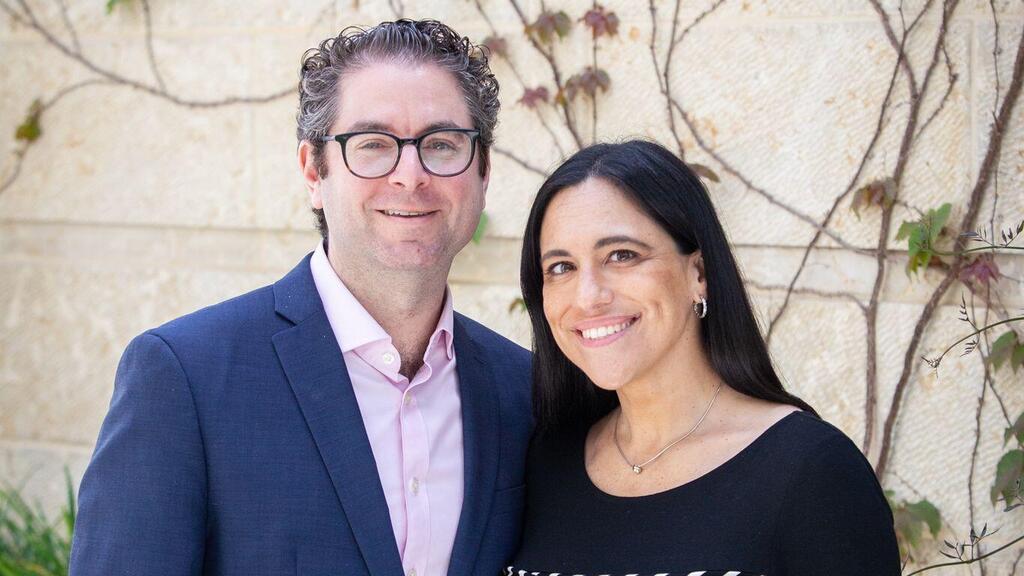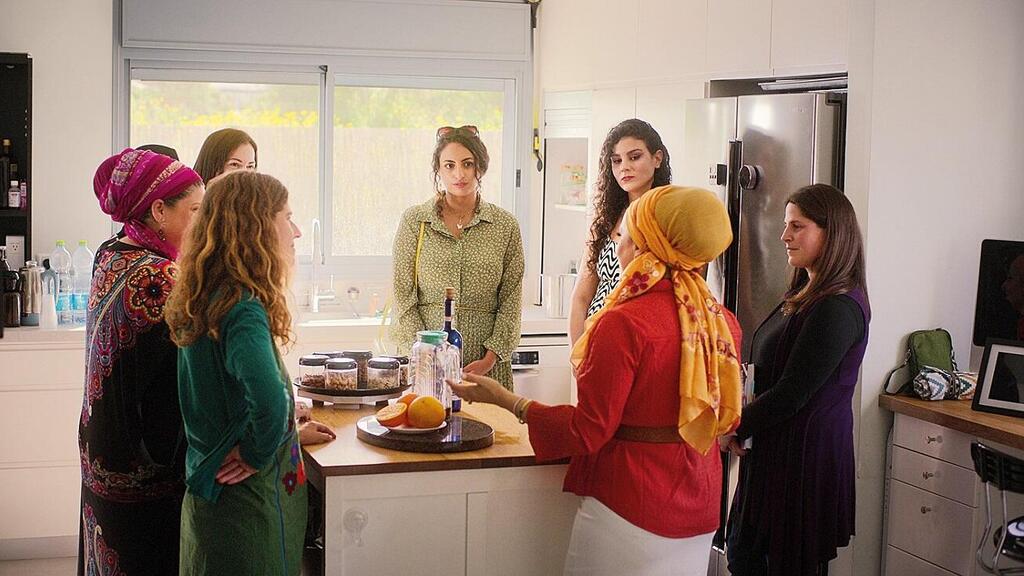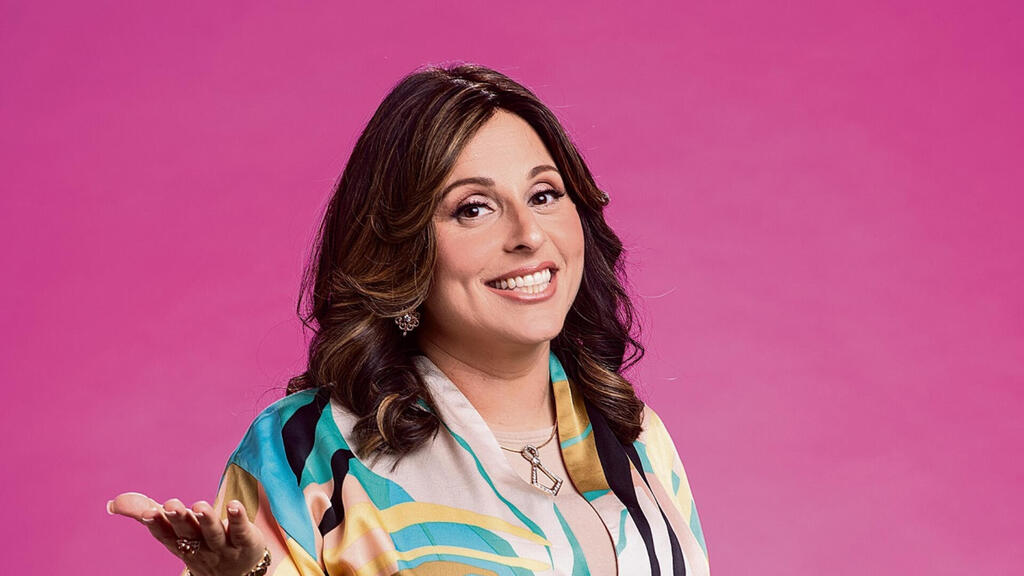In two weeks, Jeremy Hamburgh and Ilana Frank will stand under the chuppah and get married. They met through friends about three years ago, at a mutual friend's wedding. Usually, Los Angeles-based couple is used to being on the other side of the equation - the ones who help others who have been matched.
Read More:
What sets them apart is the focus on a special population: as part of an extraordinary initiative, they train autistic people from the Jewish community to succeed in the world of dating and friendship. Their activity on the subject led them to a friendship and a partnership with Aleeza Ben Shalom, star of the Netflix reality show Jewish Matchmaking.
The American Jewish couple met in April 2020, and since then Ilana (39) has been a member of the business that Jeremy (40) founded about a decade earlier. Together they coach autistics and help them learn marital and social skills, including guiding them in the world of dating.
"My Jewish mother is very moved by the work we are doing," says Hamburgh. "We are also very excited and happy to serve the Jewish community. Ilana and I both come from very Jewish families and we see our work as a kind of tikkun olam, and specifically tikkun for the Jewish community.
Jeremy first started in the field around 2007. "I started a young professional's organization for a synagogue that I was a member of, regardless of autism. I noticed that many young Jews came to Shabbat dinners and all kinds of holiday events, and all of them were single. They came not because of the synagogue but to find spouses," he recalled. "
My friends asked me: 'What are you doing right compared to what we are doing? How is it that you come to Shabbat dinner alone and leave with new people, and we don't?' I would honestly answer that I really don't know, but that I'll try to figure it out.”
From there he embarked on a journey of three years of research, in which he tried to understand what makes people attracted to each other. "I read about psychology, biology, and the like, and then I went back to the Jewish Community Center in Manhattan and said: 'Hey, can I do a dating workshop here, so that the young people can meet and get to know people?'
They asked me if they had to pay me for it and I said: 'I guess not. I'll do it for free.' On Mondays, I taught the men, on Tuesdays, I taught the women, and on Thursdays, I would rent out the room of a local bar, and I'd train them in real-time on body language, like how to stand, how to uncross their arms and how to talk to each other.”
"What I didn't notice at the time was that so many people who came to my workshop were autistic," he says. "They turned to the management of their organizations and said: 'Hey, you should bring Jeremy to us as well'. That's how I first received invitations to work specifically with this population."
To mediate the social world
In the beginning, he knew almost nothing about autism. In the past, he was a criminal prosecutor and worked at Chase Bank in New York. "All my knowledge on the subject came from a relative who is autistic, and it wasn't much," he recalls.
"Since I used to be a prosecutor in court when I was speaking to the jury I was used to people looking me directly in the eyes, following my every move. Here I encountered people whose attention was completely different. Some were looking at their phone while I was talking, some were staring at the ceiling, and I remember going to the head of the organization that invited me to lead a workshop and telling her that it was a failure because they didn’t listen to me. ‘But they loved you,' she said. ‘They just pay attention differently.’"
Hamburgh decided to be patient and give it a chance, and it paid off: "I really fell in love with these young people. I fell in love with people who really wanted and were looking for love and friendship, but their brains are not wired for the skills required to make it happen. What I realized over the next 13 years is that this community just needed someone to decode for them how to understand what’s happening in the social world."
Jeremy Hamburgh: "Most of the people we serve are high-functioning people on the autism spectrum. We teach them complex skills and at a relatively fast pace. People we work with should be interested, willing and able to participate in this learning process."
According to him, "What Ilana and I do in our program is deciphering the social world for our participants. We help them understand what we’re seeing by breaking down the social process into formulas and processes, step by step, and that enables them to have the interactions that create friendships because they now better understand the world they’re seeing, and they can be a part of it."
Giving an example
"Do you know the docu-reality show' Love on the Spectrum' on Netflix? A wonderful dating program in which men and women on the autistic spectrum are matched with each other, and they go on dates, and you can actually see and feel their desire and passion for a relationship. It's heartwarming, funny, and touching.
"The creator of the show was a guest in our weekly community meeting, and one of our client’s mothers reached out to me after the meeting and said: 'Oh, now I understand why my son has a problem connecting with people, especially with women.' She said that he knows how to react and answer comments and questions in a relevant way, but not in the way that sparks a connection.”
"For example, she said that one of our other clients in the program shared that he played in a band the week before, and her son just said: 'I've been playing the guitar.' His response is relevant, but it doesn’t create a bond. So she asked me, 'Jeremy, what can he do differently so that he creates that bond?'"
Hamburgh offered her a formula: Reaction Word + Reaction Sentence + Additional Sentence and/or Question.
"Let's say a person says: 'I played in a band last week.' The formula allows our client to give a response that can create a connection. So, applying the formula, our client’s answer could be, ‘Oh wow. That’s really cool. I’ve been playing guitar, and playing in a band sounds like a lot of fun.’ That’s a response that can create a bond.”
From Netflix with love
If words like "formula" sound too mathematical and technical to you, Hamburgh explains that there's a rationale behind it: "We're trying to define and give something solid and tangible to people whose brains are wired differently. Otherwise, they can be watching a conversation and not really understanding what's going on, not understanding the rhythm of it."
Jeremy Hamburgh: "The matchmaker makes the match, not us, but Ilana and I work in the background to help the client succeed on a date using the social skills we helped them build."
He explains that "most of the people we serve are high-functioning people on the autism spectrum. We teach them complex skills and at a relatively fast pace. People we work with should be interested, willing and able to participate in this learning process."
Recently, an international Jewish matchmaking conference was held in Jerusalem for the first time, and among the prominent speakers were the couple from California.
How did your relationship with Israel begin?
"Our customers come from all over the United States, Canada and even Australia. Now I hope we will also have a presence in Israel. It started last year, when I met Aleeza Ben Shalom, a matchmaker who lives in Pardes Hana. She said that in January she was going to hold a conference in Montreal with Rabbi Israel Bernath from Chabad, known as the 'Rabbi of Love', and asked if I would like to participate."
"I was very surprised to find out how much the topic of autism interested the matchmakers who were at the conference, and how much they cared about the autistic population. Then Aleeza said: 'We should do this conference in Israel as well. There are so many matchmakers in Israel.' So we did!"
In the meantime, Aleeza Ben Shalom was getting ready for the debut on Netflix of her series, "Jewish Matchmaking". "Aleeza asked us to coach some of the clients who come to her and need help because they are autistic, neurodivergent, or just socially awkward. Our hope is that Netflix picks up her show for another season, and that they’ll allow us to have an autistic client on the show,” Hamburgh said.
“Many autistic people hire matchmakers but don’t have all the social skills they need to succeed at dating, but when we team up, they can be successful! The matchmaker makes the match, not us, but Ilana and I work in the background to help the client succeed on a date using the social skills we helped them build,” he explained.
"This is something we do both in the non-religious world, but thanks to our collaboration with Aleeza, we are expanding our services to the religious Jewish world, as well as Israel," he said. "While there are so many matchmakers who work with people with special needs in the Jewish world, including autistics, their clients need the social skills training to be successful on their dates."
Do you define yourself as a religious person?
"I'm very Jewish," he smiles. "Ilana is more religious so we practice much more than I did in my first marriage."
Dramatic change
Ilana Frank worked for 16 years as a special education teacher and was already involved in dating in the Jewish community in the past. "After we started dating, I introduced her to my program’s participants, and she fell in love with them and they fell in love with her - and she stayed," Hamburgh recalled.
"How could I not fall in love with this community? Our clients give me purpose and meaning in life," Frank says for her part. "Getting up in the morning and helping people find connection and love - it fills me with great happiness and makes my life more complete. It's a kind of puzzle piece that I was missing without even being aware that it was missing. This is what I love doing most - helping people live their best lives."
Ilana Frank: "To see it not only through them but also through their parents' eyes, it's unbelievable. As a parent, it breaks your heart to see your adult child alone - and when they see the change that has taken place in them, it gives them confidence and peace about their children's future."
Frank, who lived in New York, followed Hamburgh to California. "I felt that our clients would benefit from me giving the male perspective, and Ilana giving her female and educational perspective," says Hamburgh.
"We work together and it works wonderfully, because our clients get two different approaches to the world. We literally sit down and guide together. We talk and discuss our clients' situations and discuss the strategy that would best suit them, so they get the best of both worlds."
One of the successes that left an impression on Frank was a client who lived with his parents and then moved halfway across the country. "During the program, he moved to his own place. He left California and moved far from home, he found a serious girlfriend, and they dated for a few months. He met her family, and the subject of marriage was even brought up. It's really amazing, and it fills me with the desire to help more people like him."
"Since his brain is wired differently, he sends us screenshots of texts from his cell phone that he receives from his girlfriend, and asks us to decipher and understand what they mean, and to help him answer, and also bring up complex topics that he wants to convey to her, such as marriage and kids," they say.
Frank emphasizes: "I never dreamed that this would be my career. It is true, I taught at school and saw my students’ growth and development, but I have never seen it so quickly as I have in this program. To see in front of my eyes how the lives of these young people are changing: mature people on the spectrum, some of whom live alone, and if they have a job, then after they come home they play video games, cut off from the outside world - and within 12 weeks they make big strides in their social lives and start living a more connected life - it's amazing.
"To see it not only through them, but also through the eyes of their parents, it's an unbelievable thing. As a parent, it breaks their heart to see their adult child alone - and when they see the change that has taken place in them, it gives them confidence and peace about their children's future."
All that saves one soul
Jeremy is the father of two children from his previous marriage, aged 5 and 7. About his Jewish mother, he says that "She tears up when she's running on the treadmill and watching the show 'Love on the Spectrum.' It's true, it's business - but it's also about Chesed."
What is your next project?
"Our new program for the more religious community, in collaboration with Aleeza, will be called 'From Schmoozing to Shidduch.' It’s designed for the more religious community and so that they can be more successful in dating and finding love."
"There is a Jewish saying according to which 'everyone who saves one soul from Israel is as if he saved the whole world.' With our help, they can see the world and understand it much better."
"For some of our clients it really changed their lives, for some it improved a little, but what is important to me is that many autistic people, who have given up on making contact, finding love and generally being part of the community - have hope. The fact that someone is autistic does not mean they have to be alone. We allow people to share the light and love they have to the world.”








